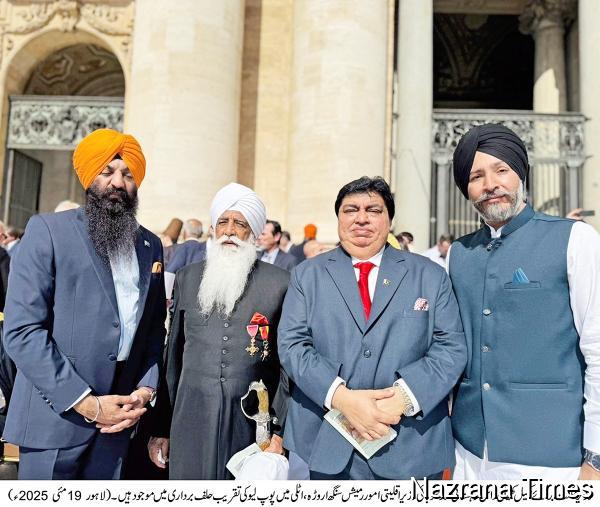Provincial Minister Ramesh Singh Arora and Minister of Khail Das Kohistani Attendes Pope Leo’s Oath taking Ceremony
- Internationl
- 19 May,2025

Extendes Congratulations on behalf of Prime Minister of Pakistan
Lahore, May 19: Ali Imran Chattha
On the special instructions of Prime Minister of Pakistan, Mian Muhammad Shehbaz Sharif, Minister of State for Religious Affairs and Interfaith Harmony, Mr. Khail Das Kohistani, and Punjab's Provincial Minister for Minority Affairs, Mr. Ramesh Singh Arora, attended the Oath taking ceremony of Pope Leo in Rome, Italy.
Pope Leo is the 267th pontiff of the Catholic Church and the first American-born to hold this esteemed position.
On behalf of Prime Minister Shehbaz Sharif, the Government of Pakistan, and the people of Pakistan, Minister Ramesh Singh Arora extended heartfelt congratulations to Pope Leo. He expressed the hope that collaborative efforts would be made with the Pope to promote global peace, tolerance, interfaith harmony, and the protection of human rights. He stated that representing the Government of Pakistan at this historic occasion is a matter of great honor.
“Pakistan is a multi-religious and multicultural country where all minorities enjoy equal rights,” said Mr. Arora. He further affirmed his commitment to highlighting the significant steps taken in Pakistan for the protection and empowerment of religious minorities, as well as efforts to foster interfaith harmony.
Minister of State Khail Das Kohistani stated that this visit is not only a great opportunity to promote religious harmony on a global platform but also serves to strengthen Pakistan’s image internationally as a peaceful and progressive nation.
Posted By:
 GURBHEJ SINGH ANANDPURI
GURBHEJ SINGH ANANDPURI


Leave a Reply